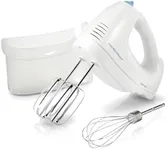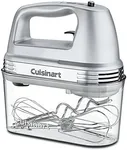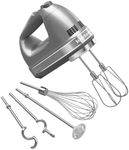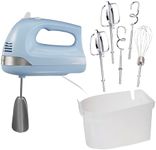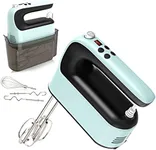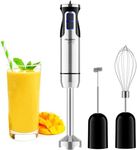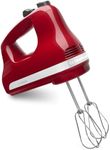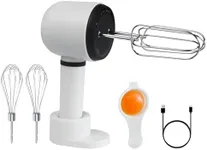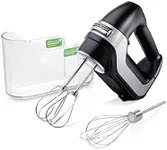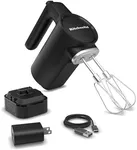Buying Guide for the Best Heavy Duty Hand Mixer
Choosing the right heavy-duty hand mixer can make a significant difference in your kitchen, especially if you frequently bake or cook large quantities. A heavy-duty hand mixer is designed to handle tougher tasks and larger batches than a standard hand mixer. When selecting the best one for you, consider the following key specifications to ensure it meets your needs and preferences.Power (Wattage)Power, measured in watts, indicates the strength of the motor in the hand mixer. This is important because a higher wattage means the mixer can handle thicker batters and doughs without straining. Typically, heavy-duty hand mixers range from 200 to 400 watts. If you plan to use the mixer for heavy tasks like kneading dough or mixing thick batters, opt for a higher wattage. For lighter tasks, a lower wattage may suffice.
Speed SettingsSpeed settings determine how fast the beaters rotate. This is crucial for achieving the right consistency for different recipes. Heavy-duty hand mixers usually offer multiple speed settings, ranging from 3 to 10. More speed options provide greater control over mixing, allowing you to start slow to avoid splattering and gradually increase speed as needed. If you often make a variety of recipes, choose a mixer with more speed settings for versatility.
Beater TypesBeater types refer to the attachments that come with the mixer, such as standard beaters, dough hooks, and whisks. These attachments are important because they determine what tasks the mixer can handle. Standard beaters are good for general mixing, dough hooks are essential for kneading bread dough, and whisks are perfect for whipping cream or egg whites. Consider what types of recipes you frequently make and ensure the mixer includes the appropriate attachments.
Weight and ErgonomicsWeight and ergonomics refer to how heavy the mixer is and how comfortable it is to hold. This is important because a heavy mixer can be tiring to use for extended periods, and poor ergonomics can lead to discomfort or strain. Heavy-duty hand mixers tend to be heavier due to their powerful motors, but they should still be manageable. Look for a mixer with a comfortable grip and balanced weight distribution to make prolonged use easier.
Durability and Build QualityDurability and build quality indicate how well the mixer is constructed and how long it is likely to last. This is crucial for a heavy-duty mixer, as it will be subjected to more intense use. Mixers made with high-quality materials, such as stainless steel beaters and robust plastic or metal housings, are more likely to withstand heavy use. Check for user reviews and brand reputation to gauge the durability of the mixer.
Ease of CleaningEase of cleaning refers to how simple it is to clean the mixer and its attachments. This is important because a mixer that is difficult to clean can be a hassle to maintain. Look for mixers with detachable, dishwasher-safe beaters and smooth surfaces that are easy to wipe down. This will save you time and effort in the long run, especially if you use the mixer frequently.
